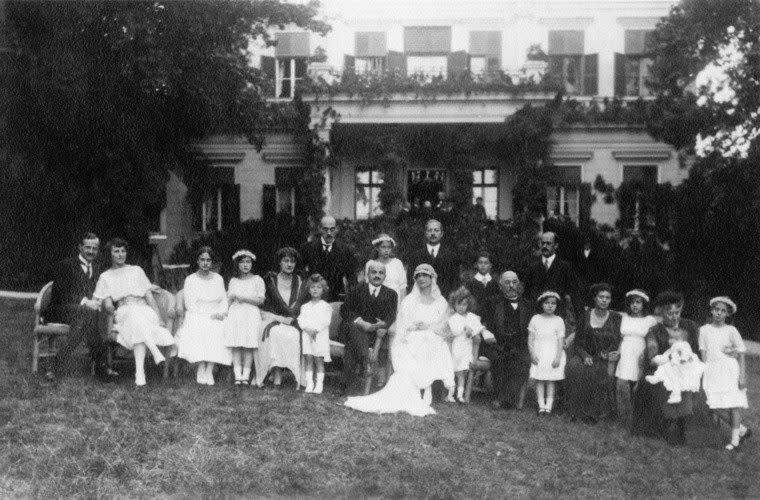Daisy Chorin von Strasser, child of Hungarian industrialists who narrowly escaped deportation to the Nazi death camps – obituary

Daisy Chorin von Strasser, who has died aged 97, narrowly escaped deportation to Auschwitz with her extended Jewish family after the Nazi occupation of Budapest in March 1944.
Born into the assimilated Hungarian Jewish aristocratic class, Daisy Chorin, by birth and marriage, belonged to two of the richest Central European industrialist families. Their combined wealth attracted the attention of Adolf Eichmann and not a few Hungarian anti-Semites: the latter relished referring to the Hungarian capital by the pejorative name “Judapest”. The blatant theft of the families’ wealth saved them from the death camps, but with its dispersal would come a complex narrative that remains shrouded in secrecy even today.
The Numerus Clausus law, which limited the number of Jews who could achieve professional degrees, particularly in law and medicine, had been in place in Hungary since 1920. This was long before the Hungarian government under Regent Miklós Horthy made the fatal mistake of backing Nazi Germany.
Despite the restrictive laws, Daisy Chorin was among the few women of Jewish background to be awarded a university place in Hungary after the law had been enacted. Though her family had converted to Catholicism in 1919, when she arrived, aged 17, for her first lecture, she was greeted with the chant “No Jews wanted here.” This abuse came from classmates, some of whom she considered friends. She left the university building, never to return.
Daisy Chorin was born in Budapest on July 18 1925, the daughter of Dr Ferenc Chorin and Baroness Margit Daisy Weiss von Csepel. Both families were of humble origin, their ancestors being minor tradespeople in the 18th century. By the beginning of the 20th century, they controlled a considerable portion of Hungary’s industrial wealth, employed more than 40,000 people and played significant roles in the political and social life of the kingdom.
The situation of the assimilated or Magyarised Jews of Hungary was rarely without its complications, but in 1849 the Habsburg Emperor Franz Joseph adopted a constitution which clearly stated that civic and political rights were not dependent on religion.

This would have an impact on Hungary and on Daisy Chorin’s family, especially after the Compromise of 1867, which created the dual monarchy of Austria-Hungary. By the time of the death of Franz Joseph in 1916, what was known as the Golden Age of Jewry in East-Central Europe was over.
Daisy’s family rightly felt they belonged to the very fabric of Hungarian society. Her father had been an economic adviser to the Hungarian delegation in Paris in 1920 when the disastrous Treaty of Trianon imposed by the victorious Allies transformed the Kingdom of Hungary into a mere rump state. As a wealthy banker and industrialist, her father had frequently been sought for advice by Horthy on both personal and state financial matters.
The Chorin’s social status seemed unassailable. It was confirmed by their great wealth and lifestyle, which included a palace in central Pest, a country estate and a valuable art collection. The trappings of great wealth would disappear soon after the arrival of the Nazis in Budapest in 1944. Devastated by their losses at Stalingrad and nearly betrayed by their ally, Horthy, the Nazis focused their attention on Budapest, particularly its rich Jewish community.
Adolf Eichmann made an assiduous study of the value to the Reich of the Weiss/Chorin industrial empire in Hungary. To the flagging war effort, it was invaluable. Much of the metal fabrication side of their business had been converted to the production of armaments.
Eichmann descended without warning on Budapest, and within two months of his arrival had transported nearly half a million Hungarian Jews to the death camps. The situation for the Chorins and their relatives became desperate. Ferenc Chorin was arrested and sent to a detention camp in Austria, where he was savagely beaten.
His condition when he returned to Budapest so distressed the family that they began negotiations to sign over their business and personal property holdings in their entirety to the Germans. In return, about 40 members of the Chorin and Weiss families would be allowed to leave Hungary. The deal was brokered by an SS thug, Kurt Becher, who worked closely with Eichmann.
All the Weiss and Chorin family members were ordered to gather at one of their Budapest villas, where Becher was waiting for them. Operating mainly on his own initiative, Becher promised that if those present signed the agreement on transferring their property, they would be taken to Vienna and then to Switzerland.
Only Daisy Chorin’s mother, also called Daisy, refused. She did not trust Becher’s promises. Completely broken and deathly pale, Daisy’s father pulled his wife aside and said to her: ‘We have no choice! We have to sign it!”
The complexity of the deal and the vast amount of money, property, art and jewels involved has remained shrouded in secrecy to this day. It garnered considerable resentment among the Budapest Jewish community.

Some thought that only their vast wealth saved so many members of one Jewish family. Daisy’s father spent the remainder of his life until his death in New York in 1964 helping Hungarian Jews and Christians who managed to escape Communist Hungary.
Daisy and her family settled first in Portugal and later in New York. She worked as a translator for Radio Free Europe. She married Rudolf von Strasser in 1956. He had joined the resistance against Hitler aged 17 and had been imprisoned. He was an academic and authority on the history of glassware from ancient times to the age of Biedermeier.
Daisy Chorin von Stressner never resented the loss of her family’s vast wealth or their former grand lifestyle. She even went so far as to meet their nemesis Kurt Becher, who escaped criminal prosecution and became one of Germany’s wealthiest businessmen.
They met in Becher’s house in Germany, but he would only receive her in the garden. She suspected his house was full of her family’s art and furniture. Interviewed when she was 94, she was asked if she hated Becher. “No,” she replied. “I share my father’s view: he was a thief, but he was also the architect of our freedom.”
Her three children survive her.
Daisy Chorin von Strasser, born July 18 1925, died November 1 2022

 Yahoo News
Yahoo News 
